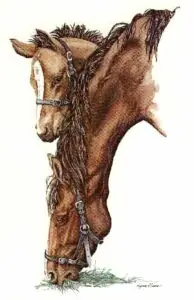Equine Assisted Therapy & Psychotherapy Insurance
Insurance programs for Equine Assisted Therapy - Equine Assisted Psychotherapy - Equine Assisted LearningCall 602.702.7600 to speak with an equine insurance specialist.
Insuring Equestrian Professionals Since 1971
AmRisk Insurance has been a pioneer in designing and underwriting insurance programs for Equine Assisted Therapy & Learning organizations for over twenty years
Premium credits are available for industry experience and membership in accredited professional associations.
Farm & Equine Programs
Equine Mortality
Risk Management
Equine Assisted Therapy Explained
Equine Assisted Therapy & Psychotherapy are evolving fields in which horses are used as a tool for both physical therapy and emotional growth and learning. Many riders experience a connection to the horse that few other sports or activities can create. For those riders who cannot walk, the horse is their vehicle of transport. Not only does this help raise their self-esteem but it also teaches them essential skills. It improves balance, creates trust and creates a friendship between rider and horse.
The benefits of Equine Assisted Psychotherapy are as numerous as the types of disabilities and conditions served. Research shows that students who participate in EAP can experience physical, emotional and mental rewards. Please use the button below to learn more about EAT.
What Are Equine-Assisted Activities and Therapies?
Throughout the world, hundreds of thousands of individuals with and without special needs experience the rewarding benefits of equine-assisted activities and therapies (EAAT). A physical, cognitive or emotional special need does not limit a person from interacting with horses. In fact, such interactions can prove highly rewarding. For instance, experiencing the rhythmic motion of a horse can be very beneficial. Riding a horse moves the rider’s body in a manner similar to a human gait, so riders with physical needs often show improvement in flexibility, balance and muscle strength. Whether it’s a five-year-old with Down syndrome, a 45-year-old recovering from a spinal cord injury, a senior citizen recovering from a stroke or a teenager struggling with depression, research shows that individuals of all ages who participate in EAAT can experience physical and emotional rewards. For individuals with emotional challenges, the unique relationship formed with the horse can lead to increased confidence, patience and self-esteem. For teams in the corporate workplace and any individual seeking better leadership, team building or communication skills, working with horses provides a powerful new paradigm.
The Role of the Equine as Partner in EAAT
New scientific research continues to reveal critical information about equine sentience- their abilities of perception, cognition, memory, and emotions such as pain and fear. Equines are able to perceive, respond to and learn from the impressions they receive from minimal sensory stimuli. The stimulus may originate from changes in human biochemistry, body language, or vocal intonations. It can also come from changes in the equine’s environment, relationships with other equines, or the equine’s general health In this way, equines make decisions based upon the stimuli they experience from others or from their environment (Hangg, 2005; Nicol, 2002; Proops, McComb, & Reby, 2009; Saslow, 2002). These abilities are based in natural, biological, physiological, and psychological traits of equines. Each equine is unique in personality, and has individual likes, dislikes and habits. The information gained from equine communication can be highly useful in all EAAT settings. Listening to equine communication can have an effect on the care of the equines, their rate of burnout, and the success of the human-equine interaction. In EAAT sessions or lessons, viewing the equine as a partner invites opportunities for relationship building and skill building with all participants served.
Program Highlights
Our national Equine Assisted Therapy and Equine Assisted Learning Insurance Programs are custom designed to meet the unique insurance needs of your Equine Assisted Therapy, Equine Assisted Psychotherapy & Equine Assisted Mental Health Program.
- A+ rated national insurance company
- Liability coverage throughout the United States & Canada
- Installment Payment Plans
- Employees, Volunteers & Premises Owners named additional insured
- Clinics, Shows & Special Events included
- Personal Injury & Advertising Liability Included
- Can be written as a Commercial Equine Package
- Care, Custody & Control coverage for non-owned horses
- Additional equine exposure coverage option
- Accident & Disability Coverage for volunteers
- Credit for professional certification
- Volunteer Accident Medical Insurance
- Directors & Officers Errors & Omission Liability Coverage
- Abuse Issues
- Addiction
- Attention Deficit Disorder
- Amputee
- Autism
- Brain Injuries
- Cardiovascular Accident/Stroke
- Cerebral Palsy
- Chemical Abuse
- Developmental Disabilities
- Down Syndrome
- Eating Disorders
- Emotional Disabilities
- Gross Motor Dysfunction
- Hearing Impairments
- Learning Disabilities
- Multiple Sclerosis
- Muscular Dystrophy
- Post Polio Speech Impairments
- PTSD
- Self Esteem & Depression
- Speech Therapy
- Spina Bifida
- Spinal Cord Injuries
- Traumatic Bran Injuries
- Visual & Auditory Impairments
Contact Us Today
PO Box 6230 Scottsdale, AZ 85261


